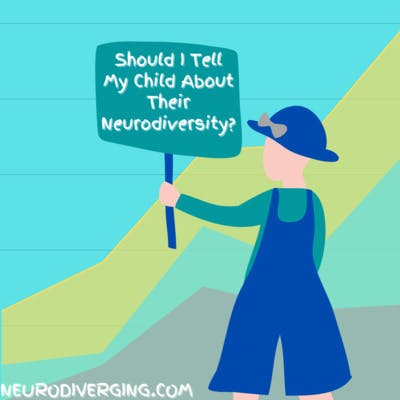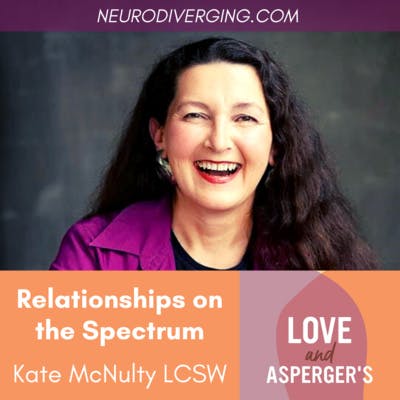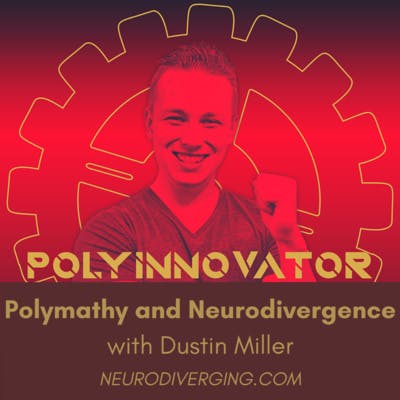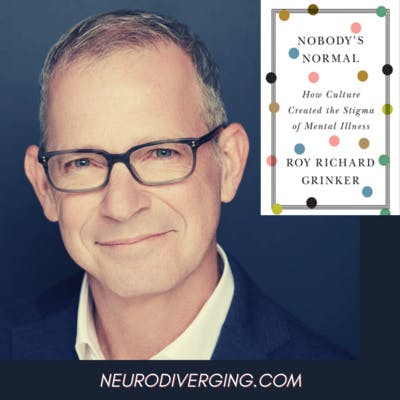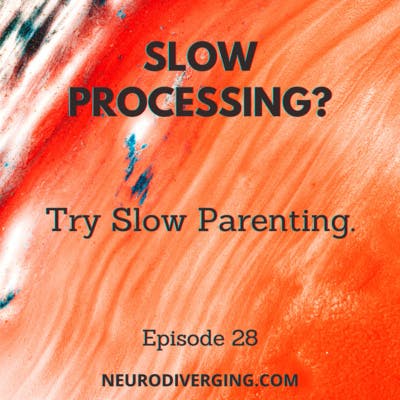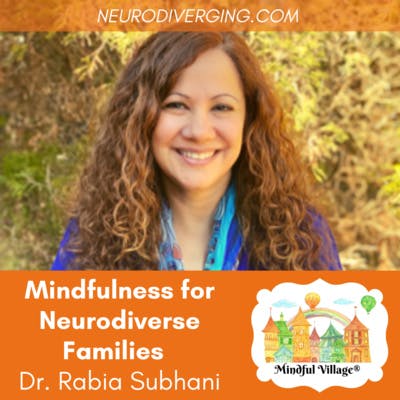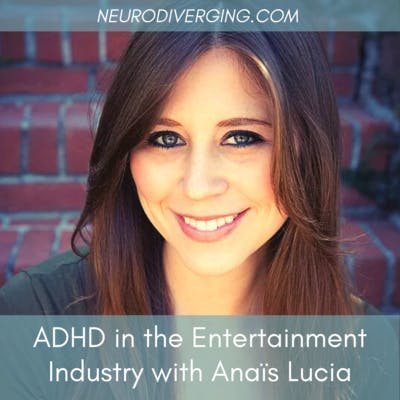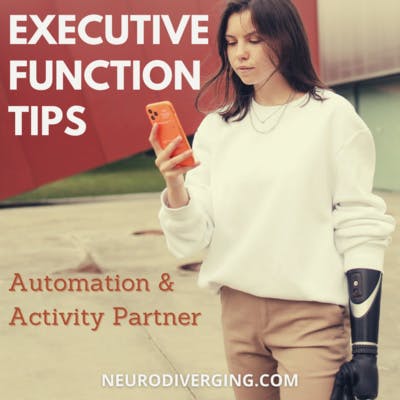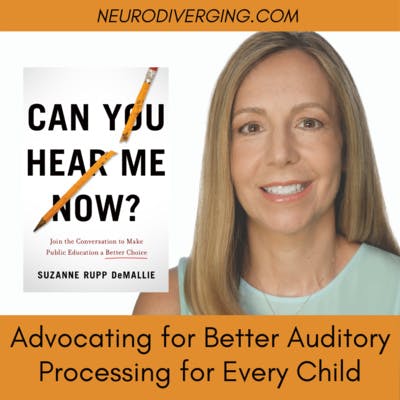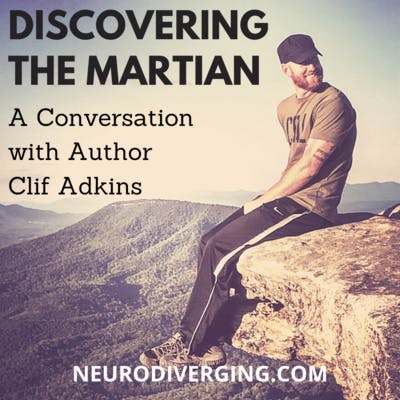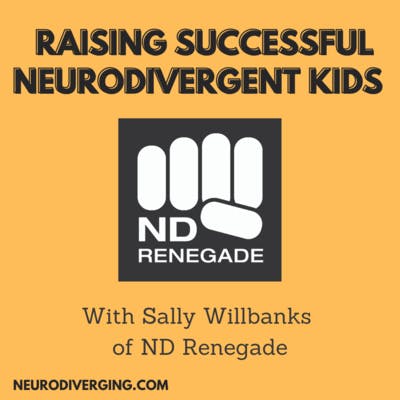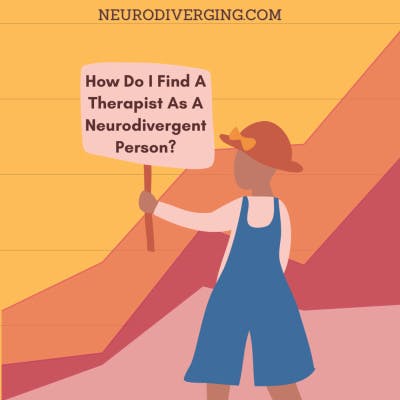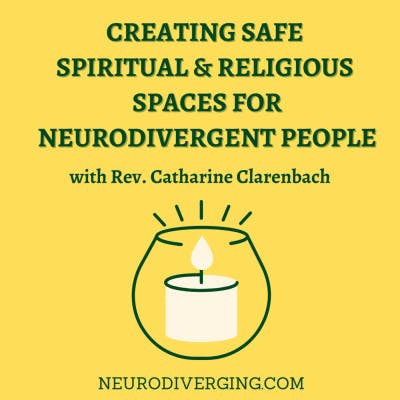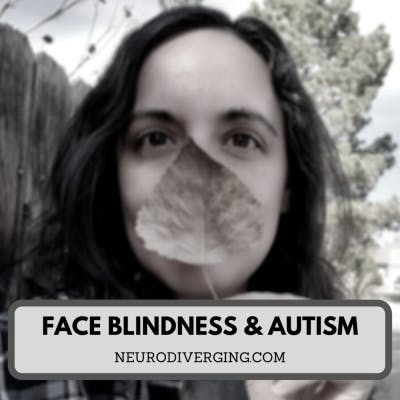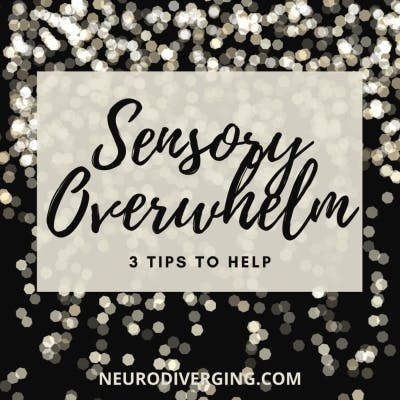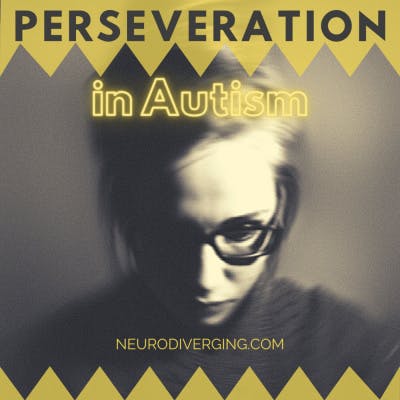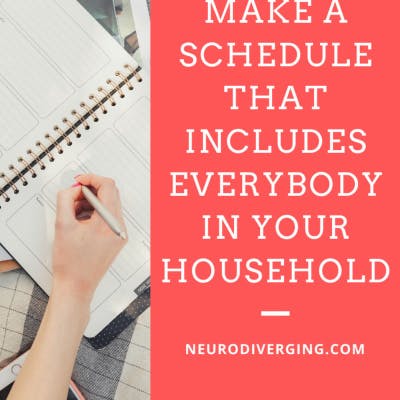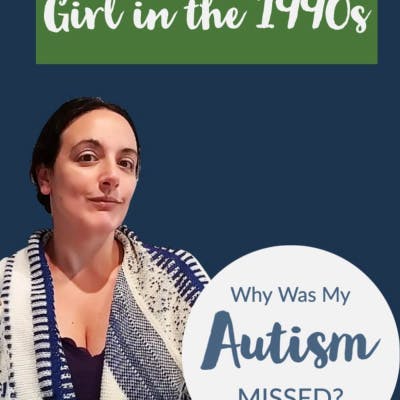Discover Neurodiverging
Neurodiverging

Neurodiverging
Author: Danielle Sullivan
Subscribed: 79Played: 1,328Subscribe
Share
© Danielle Sullivan
Description
From my neurodivergent family to yours. I'm Danielle Sullivan, a neurodiversity life coach and autistic parent with autistic and ADHD children. I'm here to help us all explore the world of neurodivergence. Neurodiverging episodes include stories and lessons from my life, deep dives into the traits and histories of ADHD and autism, and guest experts who talk about issues pertinent to ADHD and autistic folks in society. Welcome to Neurodiverging! Learn more on http://neurodiverging.com or http://patreon.com/neurodiverging.
98 Episodes
Reverse
Parenting can be a challenge for anyone, even in the most ideal conditions. But parenting a child who has a different neurotype than you can come with unique challenges.
I want to discuss a question that I've gotten a few times: Should I tell my child about their autism? How do I portray being autistic as an ultimately positive and valuable identity while not skipping over the real challenges that are associated with it?
This can be a complicated question because everybody's situation is different and unique. Find out why I think on Neurodiverging today!
Find a transcript and show notes here: https://neurodiverging.com/ep-22-asked-answered-should-i-tell-my-child-about-their-neurodiversity/
Support this podcast on Patreon: https://www.patreon.com/neurodiverging
Read “Short report: Autistic parents’ views and experiences of talking about autism with their autistic children by Laura Crane, Lok Man Lui, Jade Davies, and Elizabeth Pellicano: https://pubmed.ncbi.nlm.nih.gov/33397133/
---
Send in a voice message: https://podcasters.spotify.com/pod/show/neurodiverging/message
Learn more about your ad choices. Visit megaphone.fm/adchoices
Today I'm talking with Kate McNulty, an autistic Certified Gottman Therapist, Certified AASECT Sex Therapist, and licensed clinical social worker. We're discussing her new book, Love and Asperger's: Practical Strategies To Help Couples Understand Each Other and Strengthen Their Connection, which came out in October 2020.
Love and Asperger's is a practical guide to maintaining a loving and communicative relationship between people with different neurotypes. Kate lays out some common problem-areas that mixed neurotype couples may face, and gives direct and clear support to work through them together.
Unlike other autism-focused relationship self-help books I've read, Love and Asperger's doesn't assume that the problems in the relationship come down to the autistic person being "too" autistic. Rather, she focuses on supporting both individuals to get to know each other and their own needs better, and to communicate together to get everyone's needs met.
I've already recommended Kate's book to several of my life coaching clients, and I'm so thrilled to be able to offer this episode to you. We're discussing common relationship trouble points Kate's seen in her 20+ years of therapy practice, what's up with the word Asperger's in the title, and why self-identification is not only valid, but a necessary tool for so many folks. Enjoy!
+ Show Notes here: https://neurodiverging.com/kate-mcnulty-love-and-aspergers-relationships-on-the-spectrum/
+ Buy Love and Asperger's: Practical Strategies To Help Couples Understand Each Other and Strengthen Their Connection on Bookshop: https://bookshop.org/a/4824/9781647397241 | Amazon: https://amzn.to/36l9Rcr
+ If you'd like access to the Patrons-Only Aftershow, plus many other perks, please consider pledging $1, $5, or $10 a month to fund Neurodiverging. Find out more and pledge today at patreon.com/neurodiverging.
+ Did you know Neurodiverging now offers a FREE support group for autistic parents, monthly free live classes on neurodivergence-related topics, and a Coaching Corner twice a month on Instagram? Learn more and sign up for all of our learning opportunities here: https://neurodiverging.com/upcomingevents
--- Send in a voice message: https://podcasters.spotify.com/pod/show/neurodiverging/message
Learn more about your ad choices. Visit megaphone.fm/adchoices
Welcome back! Today's conversation is with Dustin Miller of PolyInnovator. Dustin is an OmniContent Creator, host of the Polymath PolyCast, and the host of TeleInnovator, a polymathy and self-education channel).
We had a wide-ranging discussion on self-directed education, learning how to learn, building habits and self-motivation hacks, and much more. Enjoy!
Find full show notes and a transcript here: https://neurodiverging.com/polymathy-and-neurodivergence-with-dustin-miller-polyinnovator/
Learn more about Dustin and PolyInnovator: https://polyinnovator.space/about/
Books mentioned:
Atomic Habits by James Clear on Amazon: https://amzn.to/3eaL7rJ | Bookshop: https://bookshop.org/a/4824/9780735211292
Range: How Generalists Triumph in a Specialized World by David Epstein on Amazon: https://amzn.to/3yRZ5q8 | Bookshop: https://bookshop.org/a/4824/9780735214507
Did you know Neurodiverging now offers a FREE support group for autistic parents, monthly free live classes on neurodivergence-related topics, and a Coaching Corner twice a month on Instagram? Learn more and sign up for all of our learning opportunities here: https://neurodiverging.com/upcomingevents
---
Send in a voice message: https://podcasters.spotify.com/pod/show/neurodiverging/message
Learn more about your ad choices. Visit megaphone.fm/adchoices
Welcome back! Today's guest is Dr. Roy Richard Grinker, Professor of Anthropology at George Washington University and Editor-in-chief of Anthropological Quarterly. We're discussing his newest book, Nobody’s Normal: How Culture Created the Stigma of Mental Illness, which came out in January 2021 from Norton, and tells the uplifting story of how we are successfully challenging the stigma that has long shadowed mental illnesses.
I found Nobody's Normal to be an accessible yet deep dive into how the advent of capitalism irrevocably changed Western society by creating many of the boundaries we take for granted today, including wellness and illness. Grinker challenged many of my assumptions about autism and how we as advocates engage in our push for more understanding and acceptance of neurodivergent individuals, and I am still thinking about his work many months after I finished reading.
+ Learn more about the author, Dr. Roy Richard Grinker: https://royrichardgrinker.com/
+ Buy Nobody’s Normal: How Culture Created the Stigma of Mental Illness on Bookshop: https://bookshop.org/a/4824/9780393531640 | Amazon: https://amzn.to/3gZeFug
+ Buy Unstrange Minds: Remapping the World of Autism on Bookshop: https://bookshop.org/a/4824/9780465027644 | Amazon: https://amzn.to/3de37Rd
+ If you'd like access to the Patrons-only aftershow, plus many other perks, please consider pledging $1, $5, or $10 a month to fund Neurodiverging. Find out more and pledge today at patreon.com/neurodiverging.
+ Did you know Neurodiverging now offers a FREE support group for autistic parents, monthly free live classes on neurodivergence-related topics, and a Coaching Corner twice a month on Instagram? Learn more and sign up for all of our learning opportunities here: https://neurodiverging.com/upcomingevents
---
Send in a voice message: https://podcasters.spotify.com/pod/show/neurodiverging/message
Learn more about your ad choices. Visit megaphone.fm/adchoices
We all know there are approximately one million and fourteen different parenting approaches out there, which can make it intimidating to sort through them and find the ones that work for you and your family.
In my family, we all struggle with intermittent slow processing speed, which leads us to be more overwhelmed by social events, to do lists, and housework, and even keeping up with basic needs like eating, than the average family. Luckily, after much trial and error, I found a parenting approach that supports our slower processing speeds: slow parenting.
Today, I'm talking about what slow processing speed is, how it’s related to sensory processing disorder (SPD), and how the slow parenting method can support a child who needs some extra time to work through the input she’s receiving. So, let’s dive in!
Show Notes:
-Mama OT's masterpage about sensory processing and SPD: http://mamaot.com/sensory-processing-disorder/#whatissensoryprocessing
-Sharon Brandwein’s article Why Slow Parenting Is Right for My Family: https://www.parents.com/parenting/better-parenting/style/why-slow-parenting-is-right-for-my-family/
-Want some ideas on how to create a schedule that works for everybody? Check out episode 12: https://neurodiverging.com/how-to-make-a-family-schedule/
-If you find this episode helpful and you want the Neurodiverging Podcast to continue, please consider pledging $1, $5, or $10 a month to fund it. Find out more and pledge today at patreon.com/neurodiverging.
-Transcript available at https://neurodiverging.com/slow-processing-try-slow-parenting
-Did you know Neurodiverging now offers a FREE support group for autistic parents, monthly free live classes on neurodivergence-related topics, and a Coaching Corner twice a month on Instagram? Learn more and sign up for all of our learning opportunities here: https://neurodiverging.com/upcomingevents
---
Send in a voice message: https://podcasters.spotify.com/pod/show/neurodiverging/message
Learn more about your ad choices. Visit megaphone.fm/adchoices
My guest today is Dr. Rabia Subhani, neuropsychologist, certified mindfulness teacher (many times over!), and mother of an autistic child. Rabia is the creator of Mindful Village®, a secular eight to twelve week program geared towards the parents and caregivers of neurodiverse children.
On this episode of Neurodiverging, Dr. Rabia and I are discussing what mindfulness is, how it works, why it's a good fit for many neurodiverse families, and why parents need to learn to practice mindfulness before they can teach it to their children. Plus, Rabia offers many examples of exercises you can do at home with your family!
+ Learn more about Mindful Village®: https://dsullivan--mindful-living-llc.thrivecart.com/foundations-essentials-package/
+ Sign up for your FREE Mindfulness Activities Workbook here: https://www.drrabia.com/podcast
+ Buy Peace Is Every Step: The Path of Mindfulness in Everyday Life by Thích Nhất Hạnh on Bookshop: https://bookshop.org/a/4824/9780553351392 | Amazon: https://amzn.to/3qsALIo
+ Need a Hoberman sphere to practice mindful breathing? Check out this one: https://amzn.to/2TEzJwL
+ See show notes on Neurodiverging.co: https://neurodiverging.com/mindfulness-neurodiverse-families-dr-rabia-subhani/
+ Become a Patron and get behind-the-scenes goodies, self-help and coaching resources, and more: https://www.patreon.com/neurodiverging
+ Did you know Neurodiverging now offers a FREE support group for autistic parents, monthly free live classes on neurodivergence-related topics, and a Coaching Corner twice a month on Instagram? Learn more and sign up for all of our learning opportunities here: https://neurodiverging.com/upcomingevents
---
Send in a voice message: https://podcasters.spotify.com/pod/show/neurodiverging/message
Learn more about your ad choices. Visit megaphone.fm/adchoices
My guest today is Anaïs Lucia, an ADHD-er who works as an actor, director, filmmaker, stand-up comedian, YouTuber, and host, and is also the host and producer of three podcasts!
We're discussing how she got her start in the entertainment industry, how her ADHD traits affect her work and approach to what she does, and some of her unique tips for actually finishing some of the 10,000 different projects you have going right now.
Join my Patreon to download your body doubling booklet, the Getting Unstuck Check-In, and many other resources today: https://www.patreon.com/neurodiverging
Learn more about my life coaching services: https://neurodiverging.com/life-coaching
See the show notes and transcript: https://neurodiverging.com/adhd-in-the-entertainment-industry-with-anais-lucia/
Follow Anaïs Lucia: https://www.anaislucia.com/podcasts
Did you know Neurodiverging now offers a FREE support group for autistic parents, monthly free live classes on neurodivergence-related topics, and a Coaching Corner twice a month on Instagram? Learn more and sign up for all of our learning opportunities here: https://neurodiverging.com/upcomingevents
---
Send in a voice message: https://podcasters.spotify.com/pod/show/neurodiverging/message
Learn more about your ad choices. Visit megaphone.fm/adchoices
As a certified life coach, I work with a lot of autistic and/or ADHD folks who have trouble with executive function skills, like prioritizing and organizing tasks, procrastination, difficulty getting started on a project, and other similar challenges.
If this sounds like you, then I'm here to tell you more about what executive function is and isn't, and to introduce you to two strategies to help strengthen your executive function skills: automation, and the activity partner.
Join my Patreon to download your body doubling booklet, the Getting Unstuck Check-In, and many other resources today: https://www.patreon.com/neurodiverging
Learn more about my life coaching services: https://neurodiverging.com/life-coaching
See the show notes and transcript: https://neurodiverging.com/executive-function-automation-the-activity-partner
Did you know Neurodiverging now offers a FREE support group for autistic parents, monthly free live classes on neurodivergence-related topics, and a Coaching Corner twice a month on Instagram? Learn more and sign up for all of our learning opportunities here: https://neurodiverging.com/upcomingevents
---
Send in a voice message: https://podcasters.spotify.com/pod/show/neurodiverging/message
Learn more about your ad choices. Visit megaphone.fm/adchoices
My guest today is Suzanne Rupp DeMallie, who’s recently published an amazing book: Can You Hear Me Now?: Join the Conversation to Make Public Education a Better Choice. As a parent to a child with auditory processing deficit, Suzanne fought a nationwide battle against bureaucracy to get teacher microphones into classrooms throughout the United States.
We're discussing her family's experience with auditory processing disorder, practical ideas for supporting kids dealing with the issue at home and at school, and what it was like fighting for microphones in the classroom at the national level.
I'm very grateful to my patrons, Zach, David, Teresa, Sara, and Anon! Thank you for supporting this episode of Neurodiverging!
Check Neurodiverging out on Patreon to support this podcast (now with new, way better rewards!): https://www.patreon.com/neurodiverging
Buy Can You Hear Me Now?: Join the Conversation to Make Public Education a Better Choice on Amazon: https://amzn.to/2P7cSbr / Bookshop: https://bookshop.org/a/4824/9781544517964 / or ask for it at your local bookstore.
Suzanne's website is full of fantastic resources: https://suzannedemallie.com/
Shownotes and a transcript are up at https://neurodiverging.com/auditory-processing-disorder-at-school-with-suzanne-demallie/ now!
Did you know Neurodiverging now offers a FREE support group for autistic parents, monthly free live classes on neurodivergence-related topics, and a Coaching Corner twice a month on Instagram? Learn more and sign up for all of our learning opportunities here: https://neurodiverging.com/upcomingevents
--- Send in a voice message: https://podcasters.spotify.com/pod/show/neurodiverging/message
Learn more about your ad choices. Visit megaphone.fm/adchoices
Today I'm talking with Clif Adkins, author of the new book Martian: A Non-Science Fiction Guide for How to Love, Raise, and Possibly Be Someone Not Quite Human. We're talking about who the Martian is, their most unique traits, and how to support a growing Martian at home and at school. This and more, today, on Neurodiverging!
I am continually grateful to Zach, David, Teresa, Sara, and Anon! Thank you for supporting this episode of Neurodiverging!
hit the subscribe button to make sure you are notified when there’s a new episode! https://mailchi.mp/66e2de2c4b59/signuphere
check Neurodiverging out on Patreon and support this podcast: https://www.patreon.com/neurodiverging
Buy Martian: A Non-Science Fiction Guide for How to Love, Raise, and Possibly Be Someone Not Quite Human by Clif Adkins: https://amzn.to/3vVtiE2
See the transcript and show notes here: https://neurodiverging.com/interview-with-clif-adkins-author-of-martian/
Find Clif Adkins on Facebook: https://www.facebook.com/counselorclif
--- Send in a voice message: https://podcasters.spotify.com/pod/show/neurodiverging/message
Learn more about your ad choices. Visit megaphone.fm/adchoices
This week I’m talking with Sally Willbanks, the founder of neurodiversity clothing line, ND Renegade: https://www.ndrenegade.com/. We discuss how she transitioned from being a well-known contemporary landscape artist to running a clothing line dedicated to neurodiversity; parenting autistic and ADHD profoundly gifted children; and the pros and cons of homeschooling to teach children life skills. You can also find Sally on Instagram @ndrenegade!
I want to give a warm thank you to my patrons, Zach, David, Teresa, and Sara! Thank you for supporting this episode of Neurodiverging!
- Hit the subscribe button to make sure you are notified when there’s a new episode: https://mailchi.mp/66e2de2c4b59/signuphere
- Check Neurodiverging out on Patreon, and support this podcast for as little as $1 a month: https://www.patreon.com/neurodiverging
- See Show Notes for this episode here: https://neurodiverging.com/successful-neurodivergent-kids-sally-willbanks-of-nd-renegade/
- Find Neurodiverging on Bookshop here: https://bookshop.org/shop/neurodiverging
- Did you know Neurodiverging now offers a FREE support group for autistic parents, monthly free live classes on neurodivergence-related topics, and a Coaching Corner twice a month on Instagram? Learn more and sign up for all of our learning opportunities here: https://neurodiverging.com/upcomingevents
---
Send in a voice message: https://podcasters.spotify.com/pod/show/neurodiverging/message
Learn more about your ad choices. Visit megaphone.fm/adchoices
Today’s episode is based on a listener question: Jenna wrote, “How do you go about finding a therapist as a neurodivergent person? Are there specific things to look for, or avoid?” Thanks for listening, Jenna! I think this is a great question, and one I’m happy to take a whack at.
I’m going to start off by talking about some general basics about how to find a therapist who’s a good fit, and then I’m going to move into talking about finding someone to help specifically neurodivergent folks like us!
I want to give a warm thank you to Zach, David, and Teresa! Thank you for supporting this episode of Neurodiverging!
- Hit the subscribe button to make sure you are notified when there’s a new episode: https://mailchi.mp/66e2de2c4b59/signuphere
- Check Neurodiverging out on Patreon, and support this podcast for as little as $1 a month: https://www.patreon.com/neurodiverging
- See Show Notes for this episode here: https://neurodiverging.com/how-do-i-find-a-therapist-neurodivergent/
- Find Neurodiverging on Bookshop here: https://bookshop.org/shop/neurodiverging
---
Send in a voice message: https://podcasters.spotify.com/pod/show/neurodiverging/message
Learn more about your ad choices. Visit megaphone.fm/adchoices
I’m honored to be joined on this week’s episode by Reverend Catharine Clarenbach. Catharine is a white, fat, cis woman, a sovereign queer femme with ADHD, bipolar disorder, well-managed mental illness, and trauma from sexual assault.
She is also an ordained Unitarian Universalist minister and an Initiate in the Tradition of Stone Circle Wicca (USA). She spent four years in discernment with an order of Roman Catholic religious sisters, and is trained and credentialed as a spiritual director.
In this interview, we’re talking about creating safe spiritual and religious spaces for autistic, ADHD, and other neurodivergent folks; our favorite house cleaning hacks for folks with executive dysfunction like us; and, how to keep a fruitful, fulfilling relationship with a partner who is a different neurotype than you.
Thank you to my patrons: Teresa, Dave, and Zach!
- Hit the subscribe button to make sure you are notified when there’s a new episode: https://mailchi.mp/66e2de2c4b59/signuphere
- Check Neurodiverging out on Patreon, and support this podcast for as little as $1 a month: https://www.patreon.com/neurodiverging
- See Show Notes for this episode here: https://neurodiverging.com/creating-safe-spiritual-spaces-for-neurodivergent-folks-with-rev-catharine-clarenbach/
- Buy ADD-Friendly Ways to Organize Your Life on Amazon: https://amzn.to/3qDuzMs / Bookshop: https://bookshop.org/a/4824/9781138190740
- Find Neurodiverging on Bookshop here: https://bookshop.org/shop/neurodiverging
---
Send in a voice message: https://podcasters.spotify.com/pod/show/neurodiverging/message
Learn more about your ad choices. Visit megaphone.fm/adchoices
Prosopagnosia, also known as face blindness, is very common among autistic and ADHD people. In this episode, In this episode, I’m discussing what face blindness is, how to recognize it, and how it’s affected my own life.
- Hit the subscribe button to make sure you are notified when there’s a new episode: https://mailchi.mp/66e2de2c4b59/signuphere
- Check Neurodiverging out on Patreon, and support this podcast for as little as $1 a month: https://www.patreon.com/neurodiverging
- See Show Notes for this episode here: https://neurodiverging.com/face-blindness-autism/
- Find Neurodiverging on Bookshop here: https://bookshop.org/shop/neurodiverging
---
Send in a voice message: https://podcasters.spotify.com/pod/show/neurodiverging/message
Learn more about your ad choices. Visit megaphone.fm/adchoices
Have you ever heard of sensory processing disorder? Sensory overwhelm? Sensory integration disorder? Sensory overload?
Today, I want to discuss what all this stuff if, and give you some go-to tips that I use in my everyday life to avoid sensory overwhelm.
- Hit the subscribe button to make sure you are notified when there’s a new episode: https://mailchi.mp/66e2de2c4b59/signuphere
- Check Neurodiverging out on Patreon, and support this podcast for as little as $1 a month: https://www.patreon.com/neurodiverging
- See Show Notes for this episode here: https://neurodiverging.com/3-tips-to-avoid-sensory-overwhelm/
- Find Neurodiverging on Bookshop here: https://bookshop.org/shop/neurodiverging
- Did you know Neurodiverging now offers a FREE support group for autistic parents, monthly free live classes on neurodivergence-related topics, and a Coaching Corner twice a month on Instagram? Learn more and sign up for all of our learning opportunities here: https://neurodiverging.com/upcomingevents
---
Send in a voice message: https://podcasters.spotify.com/pod/show/neurodiverging/message
Learn more about your ad choices. Visit megaphone.fm/adchoices
I am thrilled to have Erin Beal with us. Erin is the autistic and ADHD founder of the Autism Wellness Center of SW Michigan, as well as a personal trainer and a 2nd year Masters student of Developmental Disabilities at Columbia University. Erin offers freelance wellness consulting for kids, teens, and adults who are autistic or ADHD. Find her on Facebook or Instagram!
Erin was originally a communications expert and a graduate student in English until she was diagnosed with autism at age 30. Since then, she’s dedicated her career to researching and supporting individuals on the autism spectrum across all contexts and across the lifespan.
In this interview, we’re talking about what exactly goes into getting a Master’s in Developmental Disabilities, Erin’s journey from doing something completely different through getting an autism spectrum diagnosis and devoting all her energy to getting this Wellness Center open, and how much the online autism community has meant to us both. I really enjoyed our conversation and hope you will, too!
- Hit the subscribe button to make sure you are notified when there’s a new episode.
- Check Neurodiverging out on Patreon, and support this podcast for as little as $1 a month.
- See Show Notes for this episode here.
- Find Neurodiverging on Bookshop here.
---
Send in a voice message: https://podcasters.spotify.com/pod/show/neurodiverging/message
Learn more about your ad choices. Visit megaphone.fm/adchoices
Perseverative behavior is simply a repetitive behavior, an action that a person keeps repeating without meaning to. Some examples include saying the same words, moving in the same pattern, or even thinking the same unhelpful thought, long after whatever initially prompted the activity has passed. But what is driving this behavior, and why is it some common in autistic folks? That's what we're discussing today!
- Hit the subscribe button to make sure you are notified when there’s a new episode: https://mailchi.mp/66e2de2c4b59/signuphere
- Check Neurodiverging out on Patreon, and support this podcast for as little as $1 a month: https://www.patreon.com/neurodiverging
- See Show Notes for this episode here: https://neurodiverging.com/define-perseveration-in-autism/
- Find Neurodiverging on Bookshop here: https://bookshop.org/shop/neurodiverging
---
Send in a voice message: https://podcasters.spotify.com/pod/show/neurodiverging/message
Learn more about your ad choices. Visit megaphone.fm/adchoices
Misdiagnosis after misdiagnosis. Disbelief from doctors and mental health professionals after you explain your symptoms. Being shuffled from one doctor to the next with no help in sight. Giving all your energy to taking care of your mother or your child, so that there is nothing left to take care of yourself.
Millions of neurodiverse women struggle everyday to get support from their healthcare and mental health professionals that actually improves their lives. So many of us are not getting our health needs met, and are falling into more anxiety and depression because of it. What could society do better to help us?
Today, I am honored to present interviews with Lauren Melissa @autienelle, Dominica @the_ADHD_dynosaur, and Meg @arfidawareness to discuss their experiences getting help from medical and mental health systems for themselves and their families, what worked and what was a disaster, and what could be done to help neurodiverse people.
This episode and transcript are generously sponsored by I Ally. I Ally is a website and app for family caregivers, and provides personalized access to mental health providers, financial coaching and education, legal counsel, and a digitized matching service for clinical trials. Join for free today!
- Hit the subscribe button to make sure you are notified when there’s a new episode: https://mailchi.mp/66e2de2c4b59/signuphere
- Check Neurodiverging out on Patreon, and support this podcast for as little as $1 a month: https://www.patreon.com/neurodiverging
- See Show Notes for this episode here: https://neurodiverging.com/take-better-care-neurodiverse-women/
- Find Neurodiverging on Bookshop here: https://bookshop.org/shop/neurodiverging
---
Send in a voice message: https://podcasters.spotify.com/pod/show/neurodiverging/message
Learn more about your ad choices. Visit megaphone.fm/adchoices
Changing schedules can be really difficult for people with executive function troubles. I’m an autistic, and I definitely have trouble if someone changes the schedule on me with no notice. I have an expectation about my day, and have planned around exactly what I expect. When something changes, I don’t feel like I have time to think through the new potentialities.
Schedule changes can create a lot of anxiety, even a sense of panic that can lead to a meltdown (which, of course, can throw the schedule off even more, creating a stress spiral of doooooooom).
Wouldn’t it be nice if you could learn how to make a family schedule that worked for everyone in your household, with no stress and no panic?
Yes, that would be lovely, I hear you say! So today, I’d like to go through the best way I’ve found for making a household schedule that is inclusive of everybody in your house and their needs, whether you’ve got kids, or you’re living with a partner, family, or roommates.
- Hit the subscribe button to make sure you are notified when there’s a new episode: https://mailchi.mp/66e2de2c4b59/signuphere
- Check Neurodiverging out on Patreon, and support this podcast for as little as $1 a month: https://www.patreon.com/neurodiverging
- See Show Notes for this episode here: https://neurodiverging.com/how-to-make-a-family-schedule/
- Find Neurodiverging on Bookshop here: https://bookshop.org/shop/neurodiverging
---
Send in a voice message: https://podcasters.spotify.com/pod/show/neurodiverging/message
Learn more about your ad choices. Visit megaphone.fm/adchoices
In an earlier episode, I told my own story of being diagnosed autistic as an adult in my 30s, after my young son was diagnosed. I received many questions about how I didn’t know I was an autistic girl when I was younger, and why no one at home or school realized.
Being diagnosed as an adult is actually really common, and many people are diagnosed much later than I was. It can be hard to see autism sometimes, especially with autistic girls, and even more so in the 1990s when I was at school.
Today, I'm talking about why I think my autism was overlooked for so long, and what families and schools can look for now to make sure no autistic girls are going without support.
This episode is generously sponsored by I Ally. I Ally is a website and app for family caregivers, and provides personalized access to mental health providers, financial coaching and education, legal counsel, and a digitized matching service for clinical trials. Join for free today: https://i-ally.com/
- Hit the subscribe button to make sure you are notified when there’s a new episode: https://mailchi.mp/66e2de2c4b59/signuphere
- Check Neurodiverging out on Patreon, and support this podcast for as little as $1 a month: https://www.patreon.com/neurodiverging
- See Show Notes for this episode here: https://neurodiverging.com/being-an-autistic-girl-in-the-1990s/
- Find Neurodiverging on Bookshop here: https://bookshop.org/shop/neurodiverging
- Did you know Neurodiverging now offers a FREE support group for autistic parents, monthly free live classes on neurodivergence-related topics, and a Coaching Corner twice a month on Instagram? Learn more and sign up for all of our learning opportunities here: https://neurodiverging.com/upcomingevents
---
Send in a voice message: https://podcasters.spotify.com/pod/show/neurodiverging/message
Learn more about your ad choices. Visit megaphone.fm/adchoices


